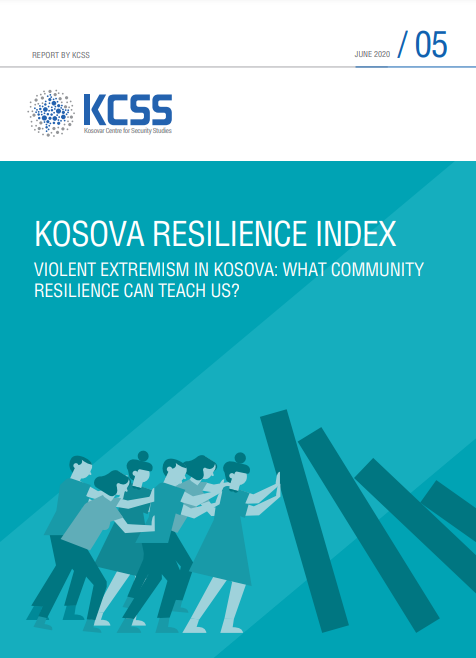30/09/2020

Kosovar Center for Security Studies (KCSS)
Embassy of Kingdom of Netherlands in Prishtina
Skender Perteshi
To measure the community resilience towards extremism and radicalization, three indicators have been treated, namely: identity and social cohesion, connection with the country, and trust in state institutions and religious harmony between communities in the country. By evaluating these indicators, we have identified the strong points of community resilience in Kosova, which should be worked on in order to create communities which are resilient against violence and radicalization.
This research finds that there is a good social cohesion within communities that have different religious beliefs and belong to different ethnicities. The communities in Kosova trust each other and there is a very good cooperation within the communities. Yet there is a lack of cooperation and interaction between the community and state institutions at central and local level in Kosova.
Citizens have low level of trust in both the municipal level and institutionally at the central level in Kosova. This is a concern since the lack of interaction between the community and state institutions creates a greater window for increased insecurity in the country, and a conducive environment for the spread of violence and radicalization.
Religious harmony remains one of the main values with which the Kosovar society is identified, thus helping the country to prevent the spread of radical religious elements internally. While there is excellent harmony between communities belonging to different religions, the challenge remains the clash of different sects or groups within the Muslim community of the country, especially within the Islamic Community of Kosova (BIK). Such clashes have antagonized the country’s practicing Muslim community and created parallel religious bodies in the country.
The national identity or the expression of national feeling remains very strong in Kosova and the community feels very proud with the determination of its national identity. The challenge remains the creation of space to freely express religious feelings or political orientation. Respondents stated that there is not enough freedom in the country to freely express their political orientation, identity or religious feeling. Such a situation is concerning due to the fact that the lack of freedom to express political orientation or religious sentiment creates an environment conducive to discrimination and stigma of communities vulnerable to extremism or radicalism in the country.
Kosova faces great challenges which have hindered the development of the country and the increase of the quality of citizens’ life which have resulted in increased insecurity among the Kosovar society for a better life in Kosova. The lack of insecurity among citizens has influenced the Kosovar society to look for alternatives for a better life by migrating to Western European countries. Challenges such as corruption, organized crime, poor education and health systems, lack of rule of law and poor governance have created an environment of hopelessness for better life in the country and have increased the level of the community’s vulnerability to extremism and radicalism in the country.
The opinions presented in this research are those of the author and do not necessarily represent the views of the Embassy of the Kingdom of the Netherlands and the Kosovar Centre for Security Studies.